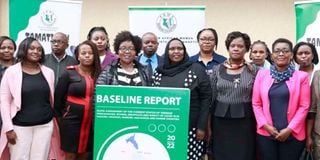Give women safe space to offer political leadership

Forum for Women Educationalists in Kenya (FAWEK) members and various stakeholders from the Education ministry during the validation of the Tamatisha Baseline report on June 29, 2022.
What you need to know:
- Since the 2013 elections, we are yet to attain gender parity.
- Patriarchy has led to public outrage over the violence and other injustices against women and disproportionately enhanced the incidence of sexual and gender-based violence and femicide.
- There is a need for structural amendment within the political domain to ensure women’s diverse engagement in politics.
Achieving gender parity in political participation is a persistent drawback globally.
In Kenya, for many years, women are under-represented in political leadership.
The 2010 Constitution established a gender quota and recognised the necessity for closing the gender gap through the two-thirds gender principle.
But 12 years later, Parliament and government organs are yet to fully implement Article 27 of the Constitution.
Women face numerous barriers when seeking political positions.
These include inadequate funding, gender-based violence, gender stereotypes and patriarchal structures in society.
In the previous elections, we witnessed scanty political support for women from their parties, particularly during the primaries for essential positions, despite gender inclusivity being in their manifestos.
Since the 2013 elections, we are yet to attain gender parity. In 2017, women comprised just 9.2 per cent of the 1,835 elected individuals.
And the seats designated to women candidates constituted 23.3 per cent of the National Assembly.
This is still below the constitutional threshold of 30 per cent and further below the Sustainable Development Goals target of 50 per cent.
Similarly, in the Executive, only seven of 21 Cabinet secretaries are women.
Gender-based violence
Patriarchy has led to public outrage over the violence and other injustices against women and disproportionately enhanced the incidence of sexual and gender-based violence and femicide, hence the need to speak out over violence against women and address the deeply ingrained patriarchal culture.
There have been instances of women politicians being attacked throughout election campaigns verbally, with physical assault, harassment and even cyberbullying—for instance, in the 2013 elections.
These tactics intimidate and discourage women politicians from engaging in active politics.
While challenging a patriarchal society, where women’s political situation is often frowned upon, these are the stumbling blocks women face in all their diversities as candidates in political spheres.
The Political Parties Act, 2011 was passed with the categorical purpose of ascertaining that candidates running as women and other members of marginalised groups have an equal opportunity to win.
Additionally, to legislative strengthening, we have seen a focus on political education for candidates, party organs and the citizens at large to support and vote for women into political leadership.
Patriarchy and gender discrimination are key drivers of violence targeting women.
They are isolated from public and community life, leading to their increased vulnerability to violence.
To achieve empowerment and equality, there is a need for structural amendment within the political domain to ensure women’s diverse engagement in politics.
Notably, the development and implementation of gender-sensitive laws are urgently needed to deal with violence against women in politics.
The citizenry must mobilise to hold governments accountable, even post-election, for the implementation of the two-thirds rule as explicitly stated in the Constitution.
Ms Kathia is a sexual and reproductive health and rights specialist. [email protected].





